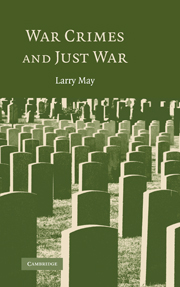Book contents
- Frontmatter
- Contents
- Acknowledgments
- War Crimes and Just War
- 1 Introduction: Justifying War but Restricting Tactics
- PART A A PHILOSOPHICAL GROUNDINGS
- PART B PROBLEMS IN IDENTIFYING WAR CRIMES
- PART C NORMATIVE PRINCIPLES
- PART D PROSECUTING WAR CRIMES
- 11 Prosecuting Soldiers for War Crimes
- 12 Prosecuting Military Leaders for War Crimes
- 13 Commanded and Commanding Defenses
- 14 Epilogue and Conclusions: Should Terrorists be Treated Humanely?
- Bibliography
- Index
14 - Epilogue and Conclusions: Should Terrorists be Treated Humanely?
Published online by Cambridge University Press: 05 June 2012
- Frontmatter
- Contents
- Acknowledgments
- War Crimes and Just War
- 1 Introduction: Justifying War but Restricting Tactics
- PART A A PHILOSOPHICAL GROUNDINGS
- PART B PROBLEMS IN IDENTIFYING WAR CRIMES
- PART C NORMATIVE PRINCIPLES
- PART D PROSECUTING WAR CRIMES
- 11 Prosecuting Soldiers for War Crimes
- 12 Prosecuting Military Leaders for War Crimes
- 13 Commanded and Commanding Defenses
- 14 Epilogue and Conclusions: Should Terrorists be Treated Humanely?
- Bibliography
- Index
Summary
Since the terrorist attacks in New York City and Washington, DC on September 11, 2001, many people have said that the way they thought of Just War theory changed. While these attacks seemed to be directed at the government of the United States, they were not conducted under the auspices of another State. And more importantly, those who took part in the attacks were not normal soldiers, at least as this category had previously been understood. Indeed, most saliently, the “terrorists” did not recognize the rules of war, failing almost grotesquely to conform to the principle of discrimination or distinction, even as I have reconceptualized that principle. In this final chapter, I will try to explain why even terrorists should be treated humanely, contrary to what most politicians said at the time of the World Trade Center and Pentagon bombings. In so doing, I will summarize some of the main conclusions reached in this book.
In many ways, the principle of humane treatment in international law is like the principle of due process in domestic law, in that both principles aim at treating everyone with a minimum of humanity. As I have said several times, war crimes are best seen as crimes against humaneness.
- Type
- Chapter
- Information
- War Crimes and Just War , pp. 301 - 324Publisher: Cambridge University PressPrint publication year: 2007



